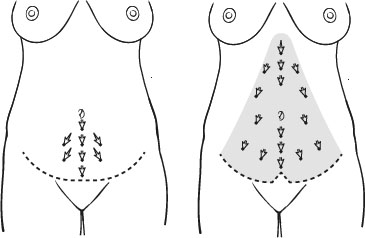28. Progressive Tension Sutures
Terri A. Zomerlei, Todd A. Pollock, Harlan Pollock
DEFINITION: PROGRESSIVE TENSION SUTURES
■ Progressive tension sutures (PTSs) securely anchor flaps over multiple points of fixation in an advanced position.
MECHANISM OF ACTION1,2
■ Reduces or eliminates dead space
• Compartmentalize space to smaller-volume areas more easily absorbed
• Eliminate the need for postoperative drains
■ Prevents repeated disruption of weak, early healing from body motion
• Tissues covered by overlying flaps in a highly mobile part of the body (e.g., abdomen, latissimus donor site) may shift with repeated movement.
• Repeated disruption of early healing leads to inflammation.
• Andrades and Prado’s analysis of seroma fluid2 showed inflammatory exudate consistent with this mechanism.
■ Minimizes tension on the flap closure
• Splinting healing wounds improves scar quality.
• Reduces scar migration from flap tension
• Distributes tension over multiple points of fixation, improving circulation to the distal flap and preventing complications such as necrosis/dehiscence
• Secures a skin element in a new position (e.g., secures the brow in a browlift)
INDICATIONS AND CONTRAINDICATIONS
SENIOR AUTHOR TIP: PTSs are based on a simple surgical concept that can be applied to any procedure involving an advancement flap. Therefore they have no specific indications or contraindications.
INDICATIONS
■ Abdominoplasty: Large area of dead space and skin excised and advanced in a highly mobile region of the body. PTS advancement and fixation:
• Eliminates disruptive shearing forces on the healing flap
• Reduces dead space
• Internally splints the healing skin flap and distal incision
• Allows in-continuity umbilical inset: Sutures placed from deep surface of flap, facilitating a natural, inverted umbilicus
■ Facelift3
• Reduces dead space
• Allows a controlled redraping of the skin after subcutaneous dissection
■ Subcutaneous browlift4
• Provides an accurate and secure positioning and shaping of the brows
• Advances the flap
• Reduces dead space
• Allows skin closure under minimal tension
• Eliminates the need for drains or lifting devices
■ Reconstructive advancement flaps5
• Reduces dead space
• Actively and securely advances the flap
• Prevents shearing forces on the healing flap
CONTRAINDICATIONS
■ Progressive tension suturing is an adjunctive technique that can be applied to most conventional skin flap procedures. No unique contraindications are related to the addition of fixation sutures.
PREOPERATIVE EVALUATION
■ PTSs require no unique steps in preoperative evaluation or preparation.
INFORMED CONSENT1,6,7
TIP: The addition of PTSs has been shown to reduce complications without adding significant risk; informed consent discussions should include the relative safety, effectiveness, and ease of recovery, compared with those of standard procedures.
■ In addition to the overall risks of surgery, plastic surgeons should discuss:
• Seroma: Use of PTSs significantly reduces the risk but does not eliminate it.
• Skin dimpling
► Although this is a frequent concern, dimpling is uncommon and almost always temporary.
► Some applications are more predisposed to dimpling. In browlifts and facelifts, PTSs are applied directly to the skin, increasing the possibility of dimpling, although it is typically temporary. In abdominoplasty, proper PTS placement between superficial fascia and deep fascia makes permanent dimpling highly unlikely.
SENIOR AUTHOR TIP: If PTSs are properly placed, all tension is on the fascia—not on the skin—and permanent dimples are unlikely.
■ Revisions: No greater than with traditional techniques
TIP: The internal splinting effect of PTSs allows early ambulation in an upright posture without restrictions. The obvious benefit is patient comfort, but by eliminating a flexed posture, venous circulation is improved and VTE reduced.7
EQUIPMENT
■ Absorbable suture
• Interrupted: Polyglactin suture: #0 or #00 sutures for PTSs
• Continuous: Barbed polydioxanone suture
► Quill (Angiotech Pharmaceuticals) is a bidirectional barbed suture secured and started in the middle of the incision area.
► V-Loc (Medtronic) is a unidirectional barbed suture.
SENIOR AUTHOR TIP: Surgeons choose the type or size of suture material and the exact placement or number of sutures to obtain a secure fixation of the skin flap in an advanced position.
TECHNIQUE7,8
TECHNIQUE FOR PROGRESSIVE TENSION SUTURES
■ Interrupted sutures (Fig. 28-1)






